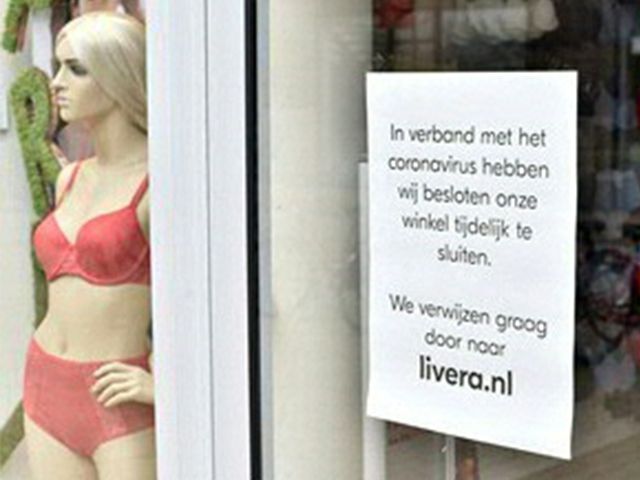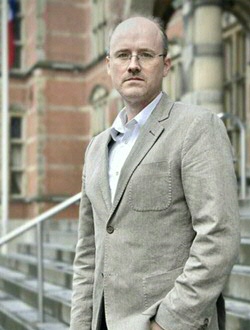De psychologische impact van de coronacrisis

English translation below
Wat zijn de gevolgen van de coronacrisis op ons welbevinden? Wat denken mensen over deze pandemie? Wat zijn hun verwachtingen over de economische gevolgen ervan, over de toekomst? Psycholoog Pontus Leander leidt een wereldwijd psychologisch onderzoek, PsyCorona, naar de gevolgen van de coronacrisis.
Tekst: Eelco Salverda, afd. Communicatie / Foto's: Elmer Spaargaren
Deelnemers aan PsyCorona vullen in een online enquête vragen in over hun gedachten, gevoelens en zorgen over het virus. Ook geven ze aan welke gevolgen ze verwachten voor hun financiële positie en voor de samenleving. ‘Psychologie en cultuur kunnen de verspreiding van het virus beïnvloeden,’ verklaart Leander het doel van het onderzoek. ‘De psychologie van de mens kan ook veranderen als reactie op de pandemie. Met gedrags- en datawetenschappers willen we plekken kunnen identificeren waar vlug opgetreden moet worden om de verspreiding van de pandemie tegen te gaan en de sociale schade tot een minimum te beperken.’
Verschillen tussen landen
Het onderzoek begon als een samenwerking tussen de RUG en New York University-Abu Dhabi. Groningen functioneert als knooppunt, met Leander als hoofdonderzoeker. Intussen kent het project vertakkingen over heel de wereld en doen er al meer dan 100 psychologen aan mee. De enquête is nu in meer dan twintig talen in te vullen, dagelijks komen er talen bij. Dat het onderzoek in diverse landen plaatsvindt voegt een extra dimensie toe, legt Leander uit. ‘Van strenge lockdown tot liberaler beleid, van het dragen van maskers tot ontkenning van de ernst: regeringen en inwoners van een land reageren verschillend op de pandemie. Wij willen weten of die verschillen wellicht verklaard kunnen worden door psychologie en cultuur.’
Unieke situatie
Op straat is het stil, winkels beperken het aantal bezoekers. Veel mensen werken thuis, al dan niet afgeleid door het schoolwerk van hun kroost. Bij de ingang van de supermarkt wassen we onze handen, om vervolgens een ter plekke schoongemaakt winkelwagentje toegeschoven te krijgen om afstand te kunnen houden. We bevinden ons in een situatie die onvergelijkbaar is met enige andere. Een uniek moment voor onderzoek? Leander: ‘Psychologisch onderzoek is op dit moment noodzakelijk. In stabiele tijden ontwikkelen we theorieën en hulpmiddelen die we testen in onze laboratoria. In crisistijden moeten we die theorieën en hulpmiddelen daadwerkelijk op de proef stellen.’

Wisselende stemmingen
Dagelijks hogere sterftecijfers, prognoses van het CPB over een naderende recessie, drukte en stress in de zorg, irritatie over de onproductiviteit thuis….. Het gevoel over de crisis en verwachtingen over de toekomst kunnen per dag verschillen en zijn afhankelijk van allerlei factoren. En daarmee kunnen de antwoorden binnen een land ook van dag tot dag erg verschillen. Houdt het onderzoek rekening met deze dagelijkse stemmingswisselingen? ‘Ja, wij volgen de pandemie op de voet. We breiden ons onderzoek uit met een ‘datawetenschapsmissie’ die onze enquêtevragen koppelt aan de veranderingen die zich in die regio afspelen. Sommige van die veranderingen waren tot voor kort nog ondenkbaar.’ In het onderzoek komen ook vragen voorbij over complotdenken en asielzoekers. Gevraagd naar het waarom houdt Leander zich op de vlakte – net als bij sommige andere vragen. Hij wil niet te veel prijsgeven over het onderzoek om de resultaten niet te beïnvloeden.
Improviseren
Kan Leander zich een situatie voor de geest halen die een beetje in de buurt komt van de huidige, en waarin vergelijkbaar onderzoek is verricht? ‘Als het bestaat dan wil ik het draaiboek wel eens zien,’ zegt hij. Leander illustreert de invloed van de onzekere situatie voor het onderzoek. ‘PsyCorona is het soort project dat normaal gesproken maanden of zelfs jaren duurt om te plannen en te organiseren. Nu moeten we onze procedures uitbreiden in slechts enkele dagen of zelfs enkele uren. Omdat het om een wereldwijde crisis gaat, ervaren we ook extra moeilijkheden zoals taal- en vertaalproblemen, het vergroten van het maatschappelijke draagvlak en het verwerken en analyseren van reacties, allemaal in zo min mogelijk tijd.’

Anders na de crisis
‘Zullen de mensen nog hetzelfde zijn na deze crisis? Daar ben ik persoonlijk nog het meest nieuwsgierig naar,’ blikt Leander vooruit. ‘Je ziet nu dat de samenleving razendsnel verandert. Als psycholoog vind ik het interessant om te zien waar mensen voorrang aan geven en wat we juist besluiten los te laten.’
Resultaat
Wanneer het onderzoek afgerond zal zijn kan Leander nog niet zeggen. ‘We zijn nog maar een paar weken bezig en de eerste reacties zijn veelbelovend. Maar we hebben nog veel meer data nodig. Onze tijdlijn hangt volledig af van de grootte van de participatie. We hebben mensen nodig die ons willen helpen deze enquête te verspreiden. Zodra we genoeg data hebben, zullen we de eerste voorzichtig verwerkte resultaten op onze website zetten.’
Meer informatie
The psychological impact of the coronavirus crisis
What are the consequences of the coronavirus crisis for our wellbeing? What are people’s thoughts surrounding this pandemic? What are their expectations regarding its future economic consequences? Psychologist Pontus Leander is leading a global psychological study, PsyCorona, into the consequences of the coronavirus crisis.
Text: Eelco Salverda, Communication UG / Photos: Elmer Spaargaren
Participants of PsyCorona complete an online survey about their thoughts, feelings and worries regarding the virus. They also indicate what consequences they expect for their financial situation and for society. ‘Psychology and culture could influence the spread of the virus,’ says Leander, explaining the goal of the study. ‘Human psychology may also change in response to the pandemic. We aim to mobilize behavioural and data scientists to identify targets for rapid intervention, to slow the spread of the pandemic and minimize its social damage.’
Differences between countries
The study started as a collaboration between the UG and New York University–Abu Dhabi. Groningen is functioning as a nexus, with Leander as lead researcher. The project now has branches across the entire world, with over 100 psychologists already taking part. The survey can now be completed in more than 20 languages, with more language options being added every day. The fact that the study is being carried out in a number of countries adds an extra dimension, explains Leander. ‘From strict lockdowns to more liberal policies and from wearing masks to denying the seriousness of the situation: the governments and residents of each country are responding differently to the pandemic. We want to know whether psychology and culture can explain some of these differences.’
Unique situation
The streets are quiet and shops are limiting the number of customers allowed in at any one time. Many people are working from home, even if some of them are being distracted by their children’s school work. At the entrances to supermarkets, we have to wash our hands before pushing a trolley that has just been cleaned on the spot, to make sure that we can’t get too close to one another. We find ourselves in a situation that is incomparable to any other. A unique situation for research? Leander: ‘Psychological research is essential at the moment. In times of stability, we develop new theories and tools to test in our laboratories. In times of crisis, we must put those theories and tools to the test.’
Mood swings
With higher death rates every day, prognoses by the CPB Netherlands Bureau for Economic Policy Analysis about an approaching recession, pressure and stress within healthcare, irritation about not being productive at home... Feelings about the crisis and expectations about the future can change every day and depend on all sorts of factors. This also means that the answers provided in each country may differ strongly from day to day. Is the study taking these daily mood swings into account? ‘Yes, we are studying the pandemic in real time. We are scaling up our operations to include what we call a “data science mission” that links our survey questions to the changes that are occurring at the regional level. Some of these changes were unimaginable until recently.’ Questions about conspiracy theories and asylum seekers also appear in the survey. When asked why, Leander keeps his answers slightly vague, just like he did in some of his other responses. He doesn’t want to reveal too much about the study, as he does not want to influence the results.
Improvising
Can Leander remember another situation that is somewhat comparable to the current one, about which similar research was also conducted? ‘If such a situation existed, I sure would like to see their strategy,’ he says. Leander explains how the uncertainty of the situation influences the study. ‘PsyCorona is the type of project that would usually take months or even years to plan and coordinate. But now, we have to elaborate our processes in days, sometimes even hours. Given that it is a global crisis, we are also experiencing extra difficulties such as language and translation issues, attempting to increase societal support, and processing and analysing the responses, all in the shortest time possible.’
Different after the crisis
‘Will people still be the same after this crisis? That is what I am personally the most curious about,’ admits Leander. ‘Civilization is changing extremely rapidly. As a psychologist, I am interested to see what people prioritize and what we start letting go of.’
Results
Leander can’t say when the study will be completed. ‘We just started a couple of weeks ago and the initial responses have already been promising. Nevertheless, we still need much more data. Our timeframe completely depends on the extent of participation. We need people who want to help us get the word out about this survey. As soon as we have enough data, we will start posting carefully-processed results on our website.’



